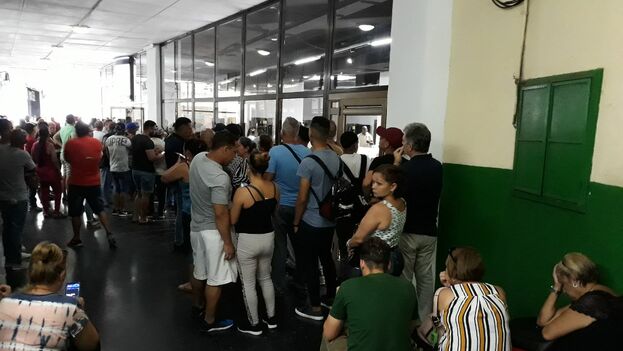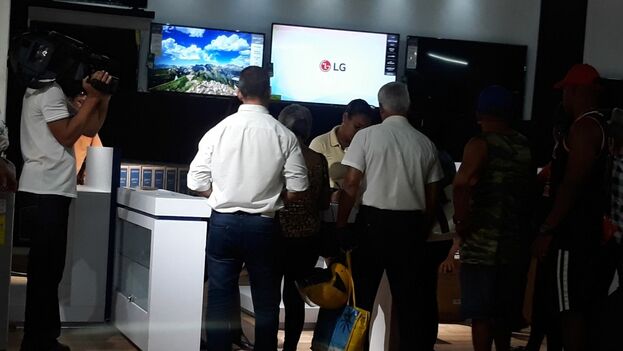
![]() 14ymedio, Luz Escobar, Havana, 28 October 2019 — The first ones line marked their places starting on Sunday morning, but the long wait failed to reduce the excitement when the foreign exchange store of Havana’s Focsa building opened its doors on Monday. With the official television cameras in place, the staff checked that the customers’ magnetic cards and matched them to their identity cards before letting them enter in groups of six at a time.
14ymedio, Luz Escobar, Havana, 28 October 2019 — The first ones line marked their places starting on Sunday morning, but the long wait failed to reduce the excitement when the foreign exchange store of Havana’s Focsa building opened its doors on Monday. With the official television cameras in place, the staff checked that the customers’ magnetic cards and matched them to their identity cards before letting them enter in groups of six at a time.
Everything shone, although still visible were the remains of some adjustments and repairs made in great haste to get the premises ready for the 28 October opening More than a hundred people crowded together when, at half past nine in the morning, the door hinges turned and the first sale of goods to the public in dollars in almost two decades began.
The first buyer to cross the threshold of the store was a lady with a walker who appealed to priority in line for people with disabilities. Inside, in the large room, air conditioners of one or several tons were seen, along with domestic electrical devices such as oil-free fryers, automatic washing machines and refrigerators with two or more doors.
“I just want to go in to look, take some pictures and show my husband what is there, so we can decide what we are going to buy,” explained a woman who was not allowed access by the security guard. In the first hours of the opening of these shops, only those who expressed their intention to buy could enter and those who came to browse the brands and prices were turned away.

The scene reminded a retiree who lined up on Sunday afternoon what he had experienced in the mid-90s of the last century when the Cuban economy was dollarized and the first stores in convertible currency, known as shoppings (using the English word), opened . “Then you had to show the green tickets to enter and now the magnetic card is the same thing,” he compared.
The pensioner told 14ymedio everything he had had to do to be in line this Monday. “I stood in line at the Metropolitan Bank for hours last Tuesday and I was able to open the dollar account, in which I deposited 400 dollars that I had saved from the last time my son sent me money,” he summarized. “What I am looking for is a flat screen TV because my old Panda is almost no longer viewable.”
Before Monday, the retiree’s options would have been to resort to the informal market that feeds on the goods imported by the mules from Panama, Mexico or the United States, or pay the highest prices of the state store network, with a smaller variety and more outdated models. “As soon as they announced this option, I decided not to spend a centavo and to wait for the stores to open,” he says.
Niurvis, a woman who is seven-months pregnant, waits near the door to enter with the next group. “What I want is a washing machine that also dries clothes well, because I live in an apartment without a balcony and when the baby is born I don’t know where I can will be able to hang up to dry everything that gets dirty,” she explains.
Just before ten o’clock in the morning, a woman comes out pushing two boxes which contain the different parts of a Sanky brand air conditioner of the type known as a “split” — because one part of it is installed outside and one part inside. She had paid $361 for the equipment which has a ton of power and which in the black market as of this morning was quoted above 600 CUC (over $600).
“Today is the day for throwing flowers [into the sea] for Camilo [Cienfuegos] and I have had to walk a lot so that my grandson would not go empty-handed to school,” says a woman who came running for fear that she would lose her turn.
“It’s a tremendous day they have chosen to open these stores, some remembering the guerrilla and others here showing their card with the enemy’s currency to be able to enter to buy.”
For 10 CUC young couple bought, from another person, a place in line to access the premises, but once at the door the custodian warned them that only one person can enter for each card. “But we have come together and we want to decide the model of refrigerator that we are going to buy, because it is for our house, where we both live,” she insisted without managing to convince him.
“This seems like a military unit,” the young man lamented when he had to stay outside and gestured through the glass to the young woman to decide “together” which refrigerator was the most appropriate for the space they have in the kitchen. Like him, other customer’s companions also made gestures, mouthed words without uttering sound and indicated with the index finger through the window.
Several police officers stayed near the entrance and one of the uniformed men called the customer who had organized the list of names of the people in line the day before. As a general rule, although the practice of organizing the line is something traditional in a country where you have to wait to buy everything from ice cream to a television set, the authorities fine or arrest the “coleros,” those who stand in line for other people and are paid for their services.
There was no lack of cluelessness. “And what are they going to get here?” Asked a teenage girl who passed by the store half an hour after the opening. With patience, a lady explained the new method of buying appliances, auto parts and electric motorcycles with magnetic cards in foreign currency, but the girl just shrugged and said: “Ah, that …”

To her side, quick and fast, another buyer came out who had acquired a Royal brand fridge for his private business. With certain difficulties, he lifted the box onto a pedicab parked in the middle of the aisle of the central shopping arcade and left the place. The state stores do not offer home delievery right now and customers have had to solve it on their own.
Private carriers took advantage of the start of sales to offer their services for a price that ranges between 15 and 20 CUC, provided it is “in the same municipality of Plaza de la Revolución or nearby municipalities such as Cerro, Playa and Centro Habana,” clarified one of them while passing near the line. “But we can agree on a price if they go further,” he added.
“You can only buy two of each piece of equipment: two washing machines, two splits, two televisions …,” an employee repeated over and over to customers who kept asking questions every time he leaned out the door. Rationing by quantities seeks to prevent hoarders from reselling in the informal market and making a profit.
“What if I come back tomorrow and tomorrow and tomorrow?” a young man with colorful headphones and Adidas shoes joked. “How will they prevent me from buying several refrigerators if I come several times? Or is there a list of customers that they will keep from one day to the next?” His questions remained unanswered before the stunned look of the guard, who had no answers for so many questions.
_____________________
The 14ymedio team is committed to practicing serious journalism that reflects Cuba’s reality in all its depth. Thank you for joining us on this long journey. We invite you to continue supporting us by now becoming a member of 14ymedio. Together we can continue transforming journalism in Cuba.
